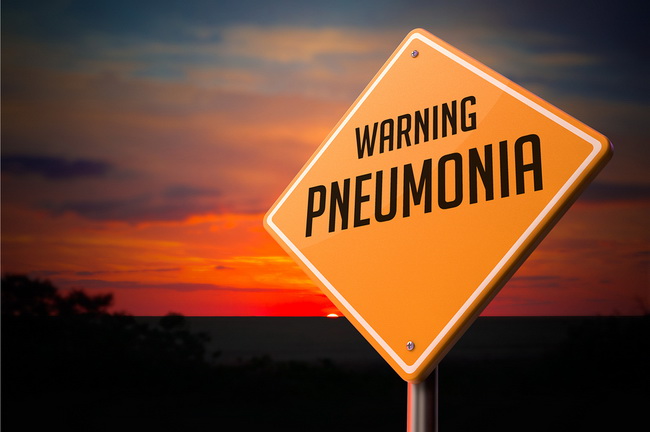- Make It Yourself Lavender Heart-Shaped Bath Bombs!
- 20 Things You Never Knew About “Down There”
- 12 Best Foods For Those Suffering From Arthritis Pain
- 12 Personal Hygiene Mistakes Almost Everyone Makes (Mom Never Told You About #4!)
- 15 Medicinal Plants And Herbs From The Cherokee People
- 12 Mind-Blowing Benefits Of Drinking Coconut Water During Pregnancy
- 12 Outstanding Winter Foods That Won’t Fatten You Up Like A Christmas Turkey
A Heart Disease Risk You Never Imagined Could Happen to You

Photo credit: bigstock.com
Heart disease is the number one killer in America, so like many people you are probably watching what you eat to try to avoid this awful disease. If you are eating less red meat, more vegetables, and trying to do some cardio, your heart should be in pretty good shape, right?
But did you know that there is one illness that you can get that will greatly increase your odds of getting heart disease and, in fact, the older you are, the greater the risk. What disease is this? Pneumonia. If you haven’t had pneumonia, thank your lucky stars. But if you have, you might already be at risk. Each year in the US, more than 1.2 million people go to the hospital for pneumonia.
This recent study tested the cardiovascular health effects on more than 1,100 subjects that had pneumonia. Scientists divided the subjects into two groups by age: those 45 to 64 and those 65 and older.
The results of this study showed that the younger group had a 2.5 times greater risk of developing heart disease in the first 3 months after leaving the hospital. After that, the risk decreased, but it took a full 2 years until that increased risk disappeared entirely.
However, for the older group, they were as much as 4 times more likely to develop cardiovascular disease within 30 days after their discharge, than persons who did not develop pneumonia. This is nearly doubles the risk for older persons. And that younger group who saw their risk lower within 2 years? The older subjects do not lower their risk for 10 years! In fact, more than one third of the subjects had a heart attack or other type of cardiovascular event within that timeframe.
The main conclusion reached from this study is that people who develop pneumonia, especially older persons, should be considered to be at a much greater risk for developing cardiovascular disease. This means that people should do everything possible to prevent pneumonia from developing, especially for the elderly, or those with other high risk factors such as diabetes, smoking, or those with respiratory problems.
Continue to Page 2

Photo credit: bigstock.com
This also means that after a person has recovered from pneumonia, both doctors and patients should develop some type of care plan, as this study shows that these patients are much more likely to develop heart disease in the following weeks or months, or perhaps even years, after this infection, as this study shows that even patients with no previous history of heart disease are at increased risk after a bout with pneumonia.
This JAMA study was published through the University of Pittsburg with Dr. Sachin Yende, who is the director of the Clinical Epidemiology program at the CRISMA Center. The paper is entitled, Association Between Hospitalization for Pneumonia and Subsequent Risk of Cardiovascular Disease. This paper was funded by the National Heart, lung, and Blood Institute, the National Institute of Neurological Disorders, and the Stroke, National Institute on Aging, as well as the Ottawa Hospital Foundation, the Ottawa Hospital’s Department of Medicine, and the National Institute of General Medical Sciences.
Scientists believe that having pneumonia causes inflammation in the body that spreads to the blood vessels and the heart muscle. Pneumonia in an infection, in one or both lungs, caused by many different types of germs such as viruses, bacteria, even fungi. It can have more than 30 different causes. About 1/3rd of all cases of pneumonia are caused by respiratory viruses, like the flu virus. It can be caused by other viruses, such as herpes simplex, SARS, and the common rhinovirus (the common cold).
However, bacterial pneumonia can occur after you have had a cold or the flu, or it can start all by itself. Those at greatest risk are those who are in a weakened state, such as those recovering from surgery, those with respiratory diseases, and especially those with weakened immune systems. The bacterium that causes pneumonia lives in healthy throat tissue but can multiply and work its way into the lungs and eventually invade the entire body.
When these germs reach your lungs, if your immune system cannot fight them off, the air sacs in your lungs will become inflamed and fill with fluid. This is the reason persons with pneumonia cannot breathe well and have a heavy, wet cough, fever, and chills. Because of the fluid buildup in the lungs, oxygen might have trouble reaching your bloodstream.
Continue to Page 3

Photo credit: bigstock.com
Perhaps the best way to avoid this risk is to take steps to avoid developing pneumonia in the first place. There are natural ways to lower your risk of developing pneumonia. Studies have shown that vitamin C not only boosts your immune system but it can help to prevent pneumonia by as much as 80 percent. Vitamin C also helps to reduce inflammation, which will help to make you less vulnerable to pneumonia. You can get super healthy doses of vitamin C by eating plenty of organic pineapples, oranges, papayas, lemons, and other citrus fruits. Or you can take a supplement. Look for a version that says it is liposomal. This means that it uses the fats in your body for better absorption. If you can’t find this version in your local health food store, you can find it easily online.
Another way you can help to prevent pneumonia is to eat more leafy greens such as spinach, kale, and Brussels sprouts. These vegetables are also well known for reducing inflammation in the body.
Other minerals, such as zinc, have been shown to help reduce the risk of pneumonia. In fact, some studies have shown that taking zinc supplements can help reduce your risk of pneumonia by as much as 41 percent.
SEE ALSO: Most Heart Attacks Can be Prevented by Just 5 Things
Important Note:
Pneumonia, especially viral pneumonia, can quickly become severe and can be fatal. This virus will invade the lungs and multiply quickly, and there are almost no signs of lung tissue becoming filled with fluid. If you have had the flu, or if you suspect that you have pneumonia, contact a health care professional as quickly as possible. If you should find you have difficulty breathing, do not hesitate to call 911 immediately.
References:
































